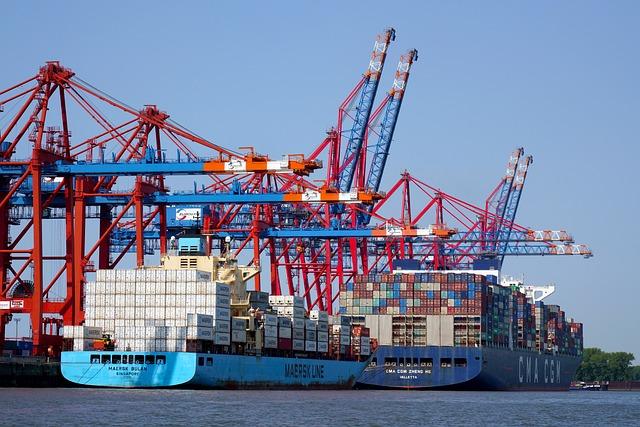Unlocking Pakistan’s Economic Potential Through Trade Innovations
In a world increasingly defined by connectivity and collaboration, nations stand at the crossroads of opportunity and challenge. For Pakistan, a country rich in resources and cultural heritage, the path to economic growth lies not only in traditional practices but in embracing innovative trade solutions. As global markets evolve and competition intensifies, the ability to adapt and innovate becomes paramount. This article explores the dynamic landscape of trade innovations in Pakistan, spotlighting how leveraging technology, fostering entrepreneurial spirit, and reimagining supply chains can catapult the country toward a prosperous economic future. By unlocking the potential that lies within its trade mechanisms, Pakistan is poised to redefine its position in the global economy, paving the way for sustainable development and growth. Join us as we delve into the strategies and innovations that can transform trade into a powerful engine of progress for this vibrant nation.
Harnessing Digital Trade Platforms for Market Expansion
In today’s interconnected world, leveraging the power of digital trade platforms is essential for businesses seeking to expand their market reach. These platforms serve as virtual marketplaces, offering a space for local entrepreneurs in Pakistan to showcase their products and services while tapping into global customer bases. With the right strategies, businesses can achieve remarkable growth by utilizing these digital avenues:
- Access to Global Markets: Digital platforms break geographical barriers, allowing Pakistani products to gain visibility among international consumers.
- Cost-Effective Marketing: Online marketplaces often provide tools for affordable marketing, enabling small businesses to compete with larger corporations.
- Data-Driven Insights: Many platforms offer analytics tools that help sellers understand customer preferences and market trends, aiding in better decision-making.
Furthermore, collaborating with digital trade platforms fosters innovation and adaptability. By integrating technological advancements, Pakistani companies can streamline operations, enhance customer experience, and leverage social media for marketing. Here’s a simple comparative table highlighting benefits of using digital trade platforms:
| Traditional Trade | Digital Trade Platforms |
|---|---|
| Limited reach | Global customer access |
| High overhead costs | Lower operational expenses |
| Time-consuming transactions | Instant payments and orders |

Revitalizing Traditional Sectors with Innovative Trade Practices
Embracing innovative trade practices has the potential to breathe new life into traditional sectors that are vital to Pakistan’s economy. By integrating technology with conventional practices, industries such as agriculture, textiles, and handicrafts can improve efficiency and reach new markets. Key strategies for revitalizing these sectors include:
- Adopting E-commerce Platforms: Traditional artisans can utilize online marketplaces to showcase their products globally.
- Utilizing Blockchain Technology: Ensuring transparency in supply chains can attract more international buyers.
- Implementing Agricultural Innovations: Using precision farming and smart irrigation techniques can enhance crop yield and sustainability.
Moreover, fostering partnerships between small-scale producers and larger corporations can create a symbiotic relationship beneficial to both. To illustrate this synergy, consider the following table outlining potential collaborations:
| Traditional Sector | Innovative Partner | Potential Benefit |
|---|---|---|
| Agriculture | Agritech Firms | Access to technology-driven farming solutions |
| Textiles | Fashion Designers | Modernize traditional designs for international markets |
| Handicrafts | E-commerce Platforms | Wider market access and increased sales |

Enhancing Trade Relationships through Strategic Partnerships
Strategic partnerships can be a game changer for enhancing trade dynamics, allowing nations to leverage each other’s strengths. By aligning with countries that share similar economic goals, Pakistan can amplify its market access, diversify its exports, and attract foreign investment. Collaborative ventures can enable the sharing of technology and expertise, leading to innovative product offerings and improved production techniques. This cooperation can be fostered through various mechanisms, such as:
- Bilateral trade agreements to facilitate smoother transactions
- Joint ventures that pool resources and expertise based on mutual interest
- Cultural exchange programs to build trust and understanding between partners
Moreover, tapping into regional trade blocs can significantly enhance Pakistan’s trade relations. By participating in platforms that promote collective bargaining and regional cooperation, Pakistan can frame its agenda on a larger stage while ensuring its interests are met. The benefits of these strategic alliances can be summarized in the following table:
| Benefits | Description |
|---|---|
| Increased Market Access | Opportunities to enter new markets with reduced trade barriers |
| Resource Sharing | Pooling resources leads to cost reductions and efficiency gains |
| Innovation and Technology Transfer | Access to advanced technologies enhances productivity |
| Cultural Diplomacy | Deepened relationships foster long-term goodwill and collaboration |

Investing in Sustainable Supply Chains for Long-Term Growth
As businesses navigate the complexities of the global marketplace, sustainable supply chains have emerged as a critical component for maintaining competitiveness and ensuring long-term growth. Investing in environmentally friendly practices not only mitigates risks associated with climate change but also enhances brand reputation and customer loyalty. Companies are increasingly embracing innovative sourcing strategies, such as:
- Local Procurement: Reducing carbon footprints and supporting local economies.
- Eco-friendly Materials: Prioritizing renewable resources to minimize environmental impact.
- Waste Reduction Programs: Implementing circular economy principles to enhance efficiency.
The real challenge lies in establishing robust frameworks that prioritize sustainability across all aspects of the supply chain. Collaboration among stakeholders can facilitate the sharing of best practices, resources, and technology, driving collective progress. To better understand the impact of investments, consider the following table that highlights key areas of focus and their potential benefits:
| Focus Area | Benefits |
|---|---|
| Renewable Energy Usage | Lower operational costs and reduced carbon emissions |
| Supplier Audits for Compliance | Enhanced transparency and risk management |
| Technology Integration | Increased efficiency and real-time tracking |
To Wrap It Up
As we stand on the precipice of a transformative era, the promise of unlocking Pakistan’s economic potential through innovative trade practices shines brighter than ever. The path ahead is layered with challenges, from bureaucratic hurdles to infrastructural deficiencies, yet the spirit of resilience and adaptability that defines the nation serves as a powerful catalyst for change. By embracing technology, leveraging strategic partnerships, and fostering a culture of entrepreneurship, Pakistan can redefine its role in global trade.
The journey is not just about economic growth; it’s about forging connections, empowering communities, and building a sustainable future. As policymakers, businesses, and citizens unite under the banner of trade innovation, they hold the key to a prosperous tomorrow. It is an invitation to explore, collaborate, and innovate—together, unlocking doors to new opportunities that resonate far beyond borders. Let us be the architects of a thriving economy, where trade is not merely an exchange of goods, but a bridge to prosperity and progress for all.



